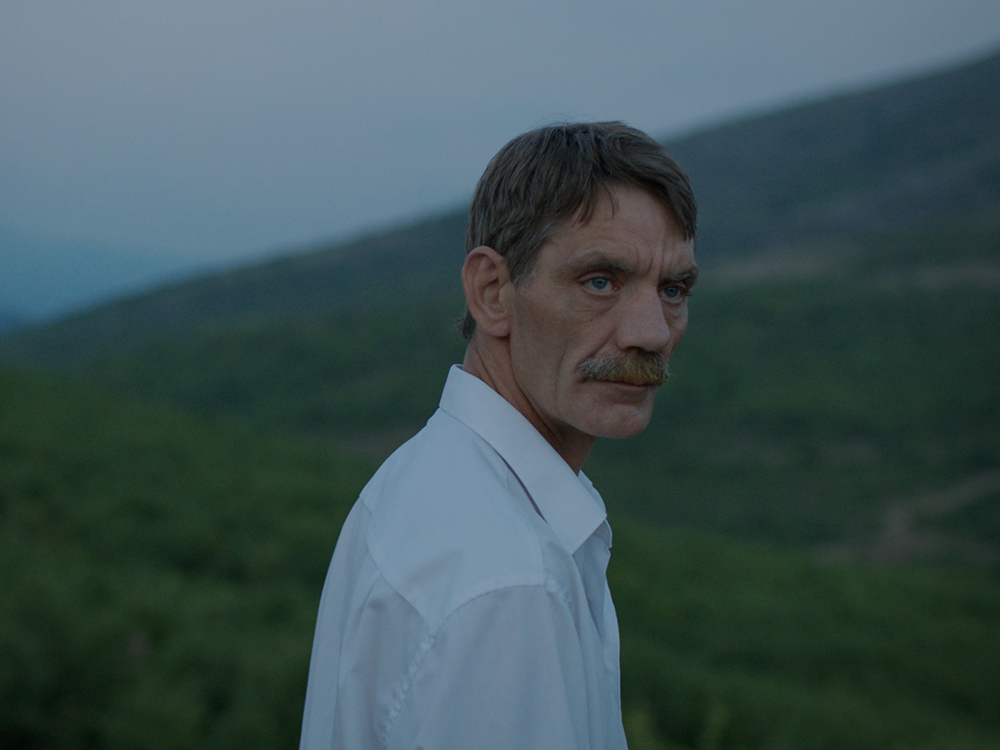
“That’s how villages are. Anything can happen.”
Adrian (Syuleyman Alilov Letifov) in Western
Andrew Chan: In Western, there are a few scenes of disarmingly tender emotional connection between the male characters. Were there moments from classic westerns that inspired this?
Valeska Grisebach: Yes. There’s Winchester ’73. I was always interested in westerns in which the main figures were not so cool. James Stewart is like a regular farmer boy in that film, but he’s on the road to revenge. There’s a night scene around a fire, and his buddy is asking him, can you go back after all this, can you work again with the animals? That part was very interesting to me – it’s like a seduction. And of course in My Darling Clementine there’s a lot of intimacy between Henry Fonda and Victor Mature. But I also like that in – you get this other kind of intimacy – it’s more like hanging out, with everyone drinking and smoking together. And everyone’s so fashionable!
Another element that Western shares with these films is the mystery that surrounds the characters’ backstories. A stoic male figure walks into town and you aren’t quite sure where he came from, why he’s there, what he’s been through.
I thought a lot about backstory. Writing the script wasn’t so easy for me. I usually start with themes and subtext and make a sort of vague intellectual construction, and then I try to find the surface. It’s like I have to hide the story and build it up in an associative way. All the ellipses are important to me – I want the viewer to have a chance to fill them in.
My main actor [Meinhard Neumann] was important for this. I was looking for this contrast between naturalism and artificial epic moments, and when I saw him for the first time, he looked so iconic, I felt like he had jumped out of an old western from the fifties. It helped me in creating something that looks natural but has an iconic feeling. He brings subtext immediately into the film – his face creates this fantasy of what might have happened to him. You think he could be a leader of a group, and at the same time it’s like he’s Joseph Conrad’s Lord Jim, full of his own fears and narcissism and maybe a bit of opportunism.
Andrew Chan in conversation with Valeska Grisebach1
“The night air is thick with secrets, possibilities, desires, longing and an undefined craving for connection. Yet a passive-aggressive atmosphere permeates the film and tension smolders with each drag of a cigarette. The unexpected – surprising or violent – is always lurking, be it off-screen, in a bush, in the dark or in the next cut. The quality of lighting greatly adds to this sense of mystery. Bernard Keller’s camerawork makes the most out of the bright and intense natural sunlight that creates distinct pockets of shade in the frame or casts ominous striped shadows through the reedy roof of the camp’s patio. Road lights are absent and outside of the fluorescent lamp in the camp or the jeep headlights, one is out in the dusk most of the time. MUBI’s Daniel Kasman described it best when he wrote that the film itself is “feeling its way as if in the dark.” The sheer sensation of perceiving the orange coachwork of a truck in the tangerine twilight is just one of the things it finds there.”
Ruben Demasure2
Gerard-Jan Claes and Arthur Theyskens: The relation between documentary and fiction does not appear as a contrast in your work, but rather as different sides of a “twirling coin.” Nevertheless, the use of reality as a “sparring partner” points to a certain status of fiction today. A lot of filmmakers seem to be “able” to get to fiction today only through a notion of documentary, in any shape. How do you look at this tension?
It just sometimes really takes my breath away. The beauty of simple material without invention, the contact between the camera and the material: a human, a face, light, atmosphere... It has such a beauty to me, even if it’s sometimes very painful. Those are these transcendent moments. I learn a lot from documentary situations, from the dramaturgy of non-fictional scenes. It’s something I always try to implement in the film, something I can’t control. On the one hand there is this story or plot, a reference to the idea of fiction, or to old legends and stories people bring to the project. It could also be a certain mechanism of fiction, like a “moment of suspense,” a moment where we as spectators all come together and wonder what’s going to happen next in the story. I think these things are very important in my work. But at the same time, I also want to lose control and get to something you can’t understand or sort out immediately. You could say it’s about a refusal to place the characters, the world depicted, “under restraint.” At other times this “quasi-naturalism” is realized artificially, sometimes it’s “stolen” from an experience in the past or an observation, and I try to re-create or memorize this experience. For me, it’s really a case of trusting the thing besides the idea or the intention; which can make us, everybody working on the project, all feel very safe throughout the process.
Gerard-Jan Claes and Arthur Theyskens in conversation with Valeska Grisebach3
- 1Andrew Chan, “Home Out of Range: A Conversation with Valeska Grisebach,” The Criterion Collection, 14 February 2018.
- 2Ruben Demasure, “Fremdkörper: On Valeska Grisebach’s Western,” photogénie, 9 November 2018.
- 3Gerard-Jan Claes and Arthur Theyskens, “Old and New Stories. A Conversation with Valeska Grisebach,” Sabzian, 6 June 2019.

